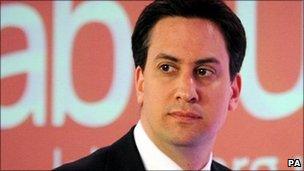Labour should have held vote referendum, says Miliband
- Published

Mr Miliband backs the Yes campaign - but many in his party oppose AV
Labour "should have" tried to change the UK voting system while it was in power, leader Ed Miliband has said.
The party broke a 1997 manifesto pledge to hold a referendum because it had "too big a majority," he admitted, but he had pushed for one in cabinet.
Mr Miliband is campaigning for a Yes vote in Thursday's referendum but many Labour MPs are voting against AV.
He said there were different views "about the national interest and indeed the party interest" in Labour.
On Thursday UK voters will be asked to decide whether they want to change the system for electing MPs from first-past-the-post to the alternative vote.
In the final hours of the campaign the No campaign's "battle bus" returned to Westminster while the Yes campaign launched a final internet advertising campaign and hit the phones.
The issue has seen Labour figures line up on both sides of the debate - and split the coalition parties as the Conservatives campaign to keep first-past-the-post, while the Lib Dems back AV.
'Not a revolution'
Mr Miliband told Radio 4's Today programme his own party had been split over the issue of AV for "about 80 years".
He said while AV was not a "revolution" it did offer a "fairer system" where MPs had to get a majority of support - arguing that under the current system two thirds of MPs are elected without the backing of most voters. The No campaign says that AV is unfair because the candidate that gets the most first preference votes is not guaranteed to win.
Mr Miliband argued there was an "anti-Conservative majority" in Britain which first past the post "doesn't give expression to".
Under the first-past-the-post system voters put a cross next to their preferred candidate while with AV voters rank candidates in order of preference.
These preferences could be used to decide the outcome in places where no candidate wins more than 50% of votes cast.
Asked why Labour had not had a referendum when it was in power, Mr Miliband said: "We should have done. It's something I pushed for in relation to the manifesto, which I was responsible for, and it was indeed in the manifesto.
"Look we had too big a majority, and when a government comes along and has a majority of 170 there's not much incentive to change the electoral system, it's fair to say."
Manifesto
Mr Miliband, who refused to share a platform with Lib Dem leader Nick Clegg to campaign for AV, argued the system would "change our political culture" because politicians would have to "reach out to other parties".
"I'm determined to lead a party that has a political culture of reaching out, proud to be Labour but yes reaching out to others."
But he denied it had been "petty" to refuse to campaign alongside Mr Clegg - arguing he had shared a platform with other senior Lib Dems such as Vince Cable, Lord Ashdown and Charles Kennedy.
He has also faced much opposition to AV within his own party - former deputy PM Lord Prescott, ex-cabinet ministers Margaret Beckett and Lord Reid and the current shadow health secretary John Healey are among prominent No to AV campaigners.
Mrs Beckett said the campaign had been "more bad-tempered than she would have liked" but rejected suggestions that opponents of change had been unduly negative in their tactics and their focus on the estimated cost of any switch.
"What we have tried to do is give people examples of what it might mean if we change our system," she told the ģÉČËŋėĘÖ.
In 1997, Labour's manifesto included a pledge to hold a referendum on changing the electoral system. The Jenkins Commission, set up to look into the issue after the party's landslide victory, recommended a proportional system be introduced for Westminster elections, but it was never acted upon.
Mr Miliband said, if voters backed AV on Thursday, he did not see it as a stepping stone to proportional representation as he backed the "one member, one constituency" system: "The alternative vote is the best way of combining that accountability of first-past-the-post with a fairer system."
Asked if Labour would abandon the issue of electoral change in the event of a No vote, he said: "Let's see what the result is tomorrow, I don't think we are going to be coming back to this very quickly."
A ComRes survey for the Independent suggests the No campaign's lead has grown - with 66% of people polled saying they would vote no, 34% yes. ComRes telephoned a random sample of 1,033 adults across the UK between 28 April and 1 May.
- Published3 May 2011
- Published24 April 2011
- Published24 April 2011